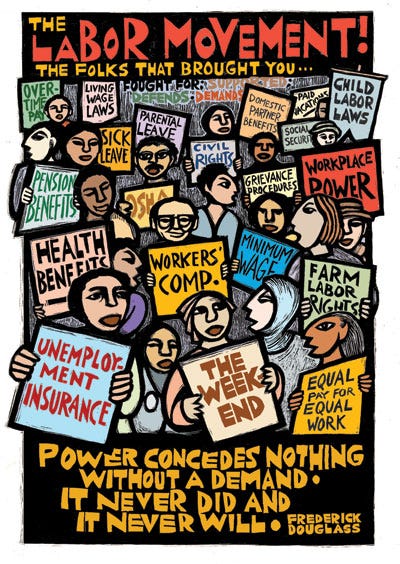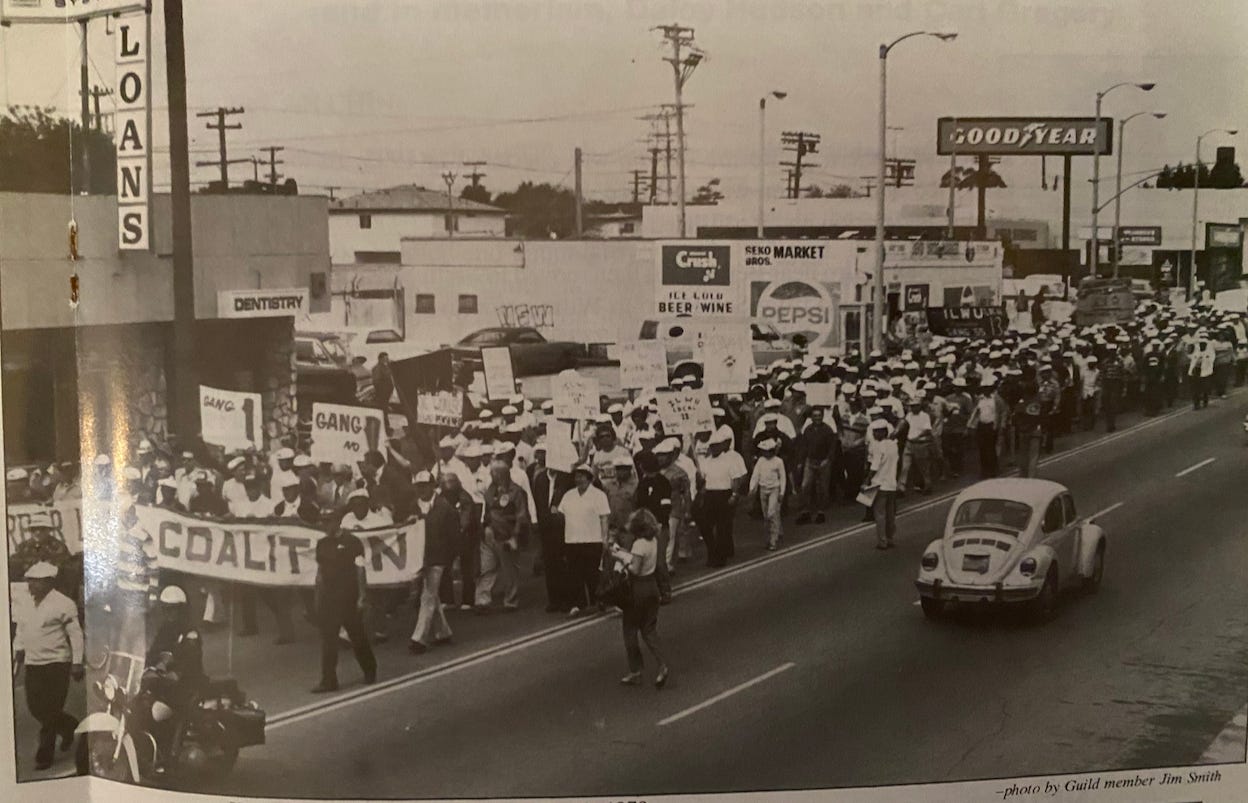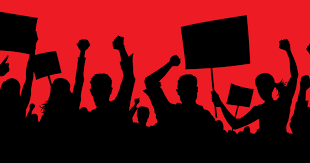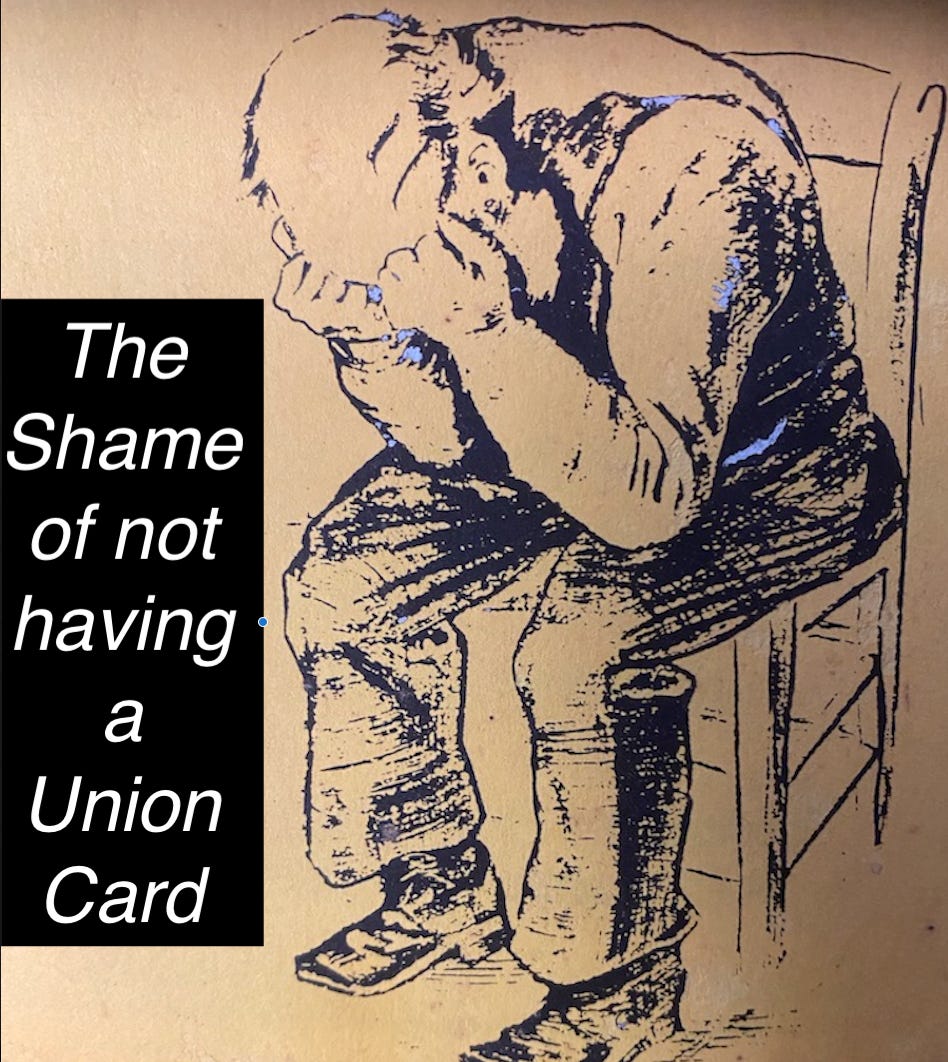Would it surprise you to know that 110 years ago, unions were the most revolutionary organizations in the United States? The Industrial Workers of the World was founded in 1905 as a revolutionary trade union. The founders included the cream of the workers movement of the time: William D. ("Big Bill") Haywood, James Connolly, Daniel De Leon, Eugene V. Debs, Thomas Hagerty, Lucy Parsons, Mary Harris "Mother" Jones, Frank Bohn, William Trautmann, Vincent Saint John, Ralph Chaplin, and many others. This was an amazing show of unity at the time and a giant step forward for the labor movement. A major union, the Western Federation of Miners, was the biggest founding organization.

Was the IWW actually revolutionary? Just listen to their founding principles:
The working class and the employing class have nothing in common. There can be no peace so long as hunger and want are found among millions of the working people and the few, who make up the employing class, have all the good things of life…It is the historic mission of the working class to do away with capitalism. Read the rest of the Preamble.
Before the IWW, also known as the Wobblies, most unions were based on a strict craft organization. There might be 10 or 15 distinct unions in a single factory. The IWW allowed all workers to join the union, no matter their trade. Whole towns became a single IWW union. As usual, not all existing organizations, such as the American Federal of Labor (AFL) thought “One Big Union” was such a great idea.
The pre-IWW labor movement still had a powerful impact on worker wellbeing in what is called the Gilded Age. It was a time, 1870-1900, much like our own, when industry and technology were booming. The railroads tied the country together, while steamships tied the world together. Workers were becoming more specialized and less replaceable. The call for a “Labor Day” became popular in the 1880s. In 1887, Oregon made it an official holiday, followed by Congress and President Grover Cleveland, one of the first “corporate Democrats,” making it a national holiday.

Labor Day or May Day – Why Not Both?
Most foreign countries picked May 1st as the official workers’ holiday. It was in honor of the victims of the Haymarket Massacre in Chicago in 1886. A peaceful rally for the 8-hour work day had been called. A bomb was thrown, for which seven of the organizers of the rally were blamed, and sentenced to death.
Over the years, the IWW was subjected to government and local repression including killings, and tar-and-feathering. It took its toll and by 1924, the IWW was no longer the most powerful labor force, although it still exists today and is well suited to expansion, particularly among free lancers and at small workplaces. Many of the past IWW members faded back into established unions but took their principles with them. They were to rise again, as organizers and activists, in the great union upsurge of the 1930s.
Also in the 1920s, the Communist Party began organizing militant trade unions, including, the Cannery and Agricultural Workers' Industrial Union, among farm workers in California. Between 1929 and 1935, the communists had organized 15 national industrial unions.

Miners to the Rescue
In 1935, John L. Lewis, another miner, and the president of the United Mine Workers, broke with his buddies in the AFL over the issue of organizing the thousands of industrial workers streaming into new jobs in auto, steel, rubber, electrical, the ports, etc.
Lewis formed, the Committee of Industrial Organizations within the AFL, then made a full break with the old guard by setting up a rival labor federation, the Congress of Industrial Organizations (CIO). The communists dissolved their unions and brought thousands of workers into the new CIO. Lewis was not a communist but welcomed the militant workers and organizers who did the leg-work of building the new unions. They were joined in this work by the non-communist IWW and by many militant workers.
The CIO likely would have been subjected to immediate repression had Franklin Roosevelt not been president. FDR knew he needed mass support for the reforms he was making. He supported making unions legal, with the passage of a bill called the Wagner Act (after NY Sen. Robert Wagner) in 1935. Unions now had the sanction of the government, and grew as never before. Workers could simply sign a union card and when the new National Labor Relations Board certified a majority for the union, it was all over for the anti-union employers.
When Roosevelt died, the corporations were ready to gut union power. The Taft-Hartley amendment to the National Labor Relations Act required elections, in which employers could interfere, before workers would get their union. Taft-Hartley was enacted in 1947 by a Republican Congress which ratified it over the veto of President Truman.

Anti-Communism and Racism
Taft-Hartley also provided for state “Right to Work” laws which would prohibit a union shop. It also required union officers to sign non-communist affidavits with the government. The anti-communist affidavits were to be the main weapon, together with racism, to weaken union power. The racism card is an old tactic for employers, and has worked time after time to derail the labor movement. Anti-communism devastated the unions in ways that are still being felt. Only recently, with the Sanders campaign has anyone dared to use the word socialism in public. Today, there’s not much difference in socialists and communists. Both intent to send this stupid system, capitalism, to the “dustbin of history.”
Within a year, 81,000 union officers from 120 unions had filed anti-communist oaths. That left known communists, suspected communists, or generic leftists who didn’t want to sign what they saw as an abridgment of their First Amendment rights, on the hot seat. Through the entire period, the Communist Party was a legal party, which ran candidates for office and took part in issues and debates. But the public had been whipped up by the “red scare,” making the U.S., in many ways, the mirror image of the Soviet Union.
Many union activists, who wouldn’t know Karl Marx from V.I. Lenin, were accused of being communists and drummed out of unions, with their accusers taking over. Many of the former union officials, with their wealth of knowledge on how to fight the employer, were forced to take low-paying jobs, change their names, move out of state, or otherwise go into hiding from the constant surveillance of the secret police (FBI).

I Step into the Ring
When I got involved in the labor movement in the 1970s, many of these know-nothings, and their protégés, who got their jobs by kissing up to their employers, were still in office. In addition, the friendly partnership that existed between labor and capital turned into the corporatization of the unions. Nice suits, dinners in fancy restaurants (they preferred steak houses), a home in the suburbs and a new car to take them there, became the lifestyle of union presidents-for-life and their cronies.
The alternative viewpoint I had, along with lots of other organizers, who were women, Blacks, Latinos, Arabs, and other people of color, were immediately suspect. Our different value system made the labor elites think we must all be commies. Organizers were treated at arms length (long before COVID), expendable, under paid and over worked. Many unions wanted nothing to do with organizing because bringing in new workers was a potential threat to the officials’ positions. Besides, the old guard didn’t know the first thing about organizing.
Our crew of 20 to 30 organizers bounced around from union to union. Workers were ecstatic that a union would help them. More than once we would bring the union thousands of new dues-paying workers, and then we would be shown the door.
Sometimes it got nasty. When the union’s own workers wanted to form a union, the union officials would do every union-busting trick in the book. On one occasion, we had to stage a sit-in at the union headquarters, a tactic pioneered by the auto workers in the Great Flint Sit-Down Strike of 1936-37. In both cases, we won union recognition. I can’t believe that back then Henry Ford was any madder than the so-called liberal who ran our union.

Some People Don’t Play Fair
Another time, a friend of a friend overheard the top two local officials of a big union (one with mob ties, the other with friends in government) plotting to put out a “contract” on me. My crime was that I had led a successful organizing campaign in 1982 for 8,000 workers.
Sure enough, about a week later the car I was driving was run into the center divider by a hit-and-run driver. I wasn’t hurt, but my very good friend, Elizabeth, sustained a broken collarbone. A week later, my house caught fire in what the Fire Department classified as arson. No one was hurt. I ended up with an “amicable” settlement with the mob guy. If I would just disappear, I’d get my full salary for six months. Cheaper for him, safer for me.
My experiences in unions has been both good and bad. The good part is being able to have a positive effect on many, many people. Workers who have lived a life of drudgery for so long that they forget what happiness is, can come alive with their new found power. That feeling spreads faster than COVID-19. The bad part is when someone in Washington kills a promising organizing campaign, forever denying the ecstatic feeling, and the chance of a better life for so many.
In the 1990s, we had great hopes that a real progressive, Richard Trumka, would become head of the AFL-CIO, which includes most of America’s unions. Trumka came from a mine worker family, and had become a labor lawyer. In 1982, he ran on a rank-and-file slate and became president of the United Mine Workers (John L. Lewis’ old union).
Trumka wasn’t the first progressive to challenge corrupt power in the miners’ union. That was Joseph “Jock” Yablonski. He ran against Tony Boyle, the incumbent, and lost in a rigged election. The Department of Labor was investigating, and probably would have overturned the election. However, Boyle hired three hitmen, who on Dec. 18, 1969, shot and killed Yablonski, his wife and daughter, as they slept. The killings weigh heavily on many miners today, and they motivated Trumka to abandon a law career and become a militant mine worker president.
In 1995, our hopes were answered, we thought, when Trumka was elected Secretary-Treasurer, and in 2009 became president of the AFL-CIO. But somewhere along the line, he “drank the kool-aid” and became part of the establishment, rather than the person we thought would lead us into a new era of militancy, possibly even class-conscious unionism.
When Donald Trump became president, he created the American Manufacturing Council. Trumka became the only labor leader to join its board. He resigned because of Trump’s racist remarks in support of the Unite the Right Rally in Charlottesville, Virginia. But still… Even Elon Musk had resigned two months earlier, when Trump pulled out of the Paris Agreement on the environment.

We Need a Strong, Militant Labor Movement
Another tarnished hero of the working class, President Barack Obama, let us down on enacting legislation allowing unions to be certified after getting more than 50 percent of the workforce to sign a union card (card check). After Obama won in 2008, and Democrats took control of both houses of Congress, and the President made Joe Biden his point man on the legislation, it fizzled. Labor’s number one objective was card check. That’s because when an election is necessary, employers will spend any amount of money and tell lies, such as “the plant will close,” or “we’ll have to lay off half the workforce to pay for a union.” As a result, we now have only 7 percent of private-sector workers in unions, even though when asked in polls if they would like to have a union, more than 50 percent say yes.
Looking back, we, the American Labor Movement, have gone in the last 110 years from espousing revolutionary action to being the corporations’ favorite hand-puppet. This doesn’t mean that we should turn up our collective noses at the unions. We need them marching, side by side with Black Lives Matter, with their union banners held high, in the front lines of mass protests.
We need them as much as they need us. If we are ever to have country that is democratic, under socialism, or less likely, under late-stage capitalism, it will only happen when millions of workers, acting in unison, demand it. A union card means that we believe in something bigger than ourselves. It means we believe “An Injury to One is an Injury to All.”
————————————————————
Now, all stand and sing the Workers’ Anthem
Solidarity Forever
by Ralph Chaplin
When the Union's inspiration through the workers' blood shall run
There can be no power greater anywhere beneath the sun
Yet what force on earth is weaker than the feeble strength of one
For the Union makes us strong
Chorus
Solidarity forever, solidarity forever
Solidarity forever
For the Union makes us strong
Is there aught we hold in common with the greedy parasite
Who would lash us into serfdom and would crush us with his might?
Is there anything left to us but to organize and fight?
For the Union makes us strong
Chorus
It is we who ploughed the prairies, built the cities where they trade
Dug the mines and built the workshops, endless miles of railroad laid
Now we stand outcast and starving 'mid the wonders we have made
But the Union makes us strong
Chorus
All the world that's owned by idle drones is ours and ours alone
We have laid the wide foundations, built it skyward stone by stone
It is ours, not to slave in, but to master and to own
While the Union makes us strong
Chorus
They have taken untold millions that they never toiled to earn
But without our brain and muscle not a single wheel can turn
We can break their haughty power gain our freedom when we learn
That the Union makes us strong
Chorus
In our hands is placed a power greater than their hoarded gold
Greater than the might of armies magnified a thousandfold
We can bring to birth a new world from the ashes of the old
For the Union makes us strong
————————————————————
Thanks for reading
Our goal at The Left Coast is to try to raise the level of dialog and understanding on the many issues in we’re confronted by in these difficult times. If you haven’t learned something new, we haven’t done our job. Stay with us for free, or kick a donation or subscription our way if you think the human race can do better with some healthy criticism. If you like the article, please click the heart symbol, or leave a comment.
–Editor, James R Smith



Polemics: Journal of the Workingclass Struggle broadcasts at:
phillycam.org/watch
Roku
Apple TV
Verizon 29/30
Comcast 66/966HD/967
Executive Producer
Ken Heard
2672597196@mms.att.net
2672597196
Great work! Thank you! Solidarity Forever!